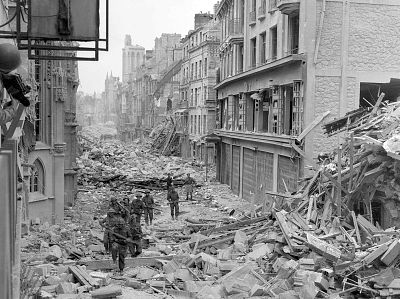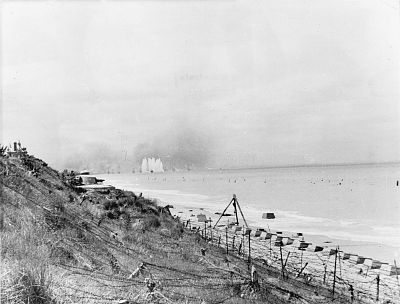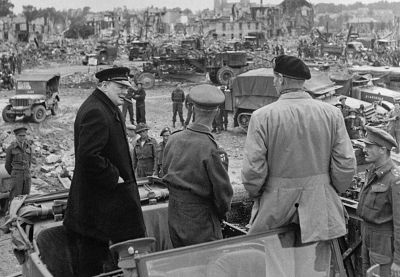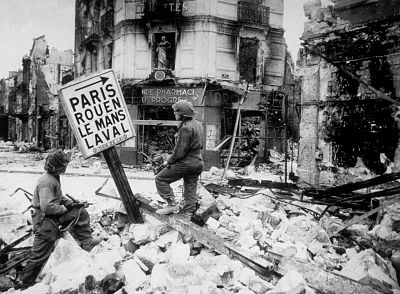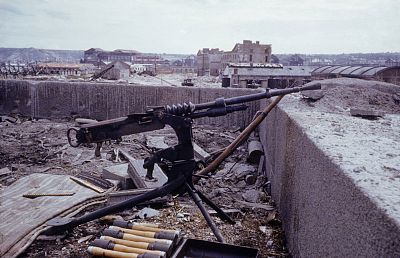World leaders will attend events this week to mark 75 years since the D-Day landings in Normand — but the post-war order is under threat.
ARROMANCHES-LES-BAINS, France — This town on the northern coast of France wore the scars of World War II with grace ahead of Thursday's 75th D-Day anniversary celebrations.
The remains of a Mulberry harbor — a kind of temporary, portable harbor that was so vital to the Allied invasion — are clearly visible from nearby cliffs, covered with daisies and purple clover. The hulking concrete structures built in secret and ferried over to the coast of Normandy allowed the Allies to pour in troops, weapons and supplies vital to liberating Europe from Adolf Hitler's Germany.
The mood is celebratory in Arromanches, but like the sirens wailing from WWII reenactors's jeeps trundling along the town's wide beach, an alarm is sounding across Europe over the future of the Western order built from the ashes of WWII.
Ties between the U.S. and its traditional European allies have become strained under President Donald Trump. This is a bitter pill for many Europeans, but particularly former enemies who were embraced after the war, according to Norbert Röttgen, a former minister and senior member of Germany's parliament, for Chancellor Angela Merkel's ruling CDU party.
"We are beyond that period that we have seen the transatlantic alliance as a United States-led community trying to shape international order from a point of values and interests," he said.
Trump has "deliberately and voluntarily said, 'I am not going to be the leader of the Free World,'" Röttgen added. "He substituted the international and unipolar and unique leadership role with the America First policies."
These alliances have brought peace and relative stability to Europe. Still, Trump has blasted NATO — the military alliance of 29 countries across North America and Europe formed in the aftermath of World War II in response to Soviet Russia — for allegedly shortchanging the U.S.
The White House has taken a hard line on trade, putting tariffs on steel and aluminum from the EU. Trump withdrew the U.S. from the Paris climate accord and the historic nuclear deal with Iran, which European countries are committed to. He has branded the the continent a "foe" and expressed support for the U.K. leaving the European Union.
The Trump administration has also spooked many in Europe's liberal democracies for his apparent embrace of hardline leaders such as Hungary's Viktor Orban and autocrats like the rulers of Saudi Arabia.
This is not an abstract thing in the economic powerhouse of Germany. A deep bond with the U.S. emerged after what Röttgen termed the "catastrophe" of World War II, when instead of punishing all of Germany for the Nazis' atrocities, the country was given a second chance. Under the Marshall Plan, Western Europe was rebuilt. And the U.S. stood at Germany's side in vital post-war struggles, including facing up to the Soviet Union, Röttgen said.
News
Trump's perceived turning his back on post-war norms and values has been deeply felt for many Germans, he said.
"It's a departure to be compared with a father leaving his son and turning away from him, and departing from the shared values and the shared foundations of a current system of living together," Röttgen added.
The Archbishop of Canterbury Justin Welby spoke to NBC News about the importance of the anniversary and what it said about the ability of former enemies to make peace.
"D-Day led, despite its horrors and the heavy fighting, to the most significant reconciliation that here has been in European history," the leader of the Anglican Communion's 85 million members said on his way to a peace conference in nearby Caen. Out of it brought together "particularly France and Germany but the wartime enemies who within 15 to 20 years had made war between them look completely impossible."
However, Jonathan Eyal, international director at the Royal United Services Institute, a London-based think tank, cautioned against casting the past 70-odd years of European-American alliance too positively and overplaying the importance of recent strains.
"Like all couples that celebrate their golden wedding anniversary, you tend to remember all the good parts and tend to sort of shunt away the bits that are the bad parts," he said.
Immediately after the war ended, there were very serious doubts about the U.S.'s commitment to the continent and whether Washington would do a deal with the Soviets and continue dividing Europe, he said.
"We also tend to forget the very passionate and deep disputes that did take place during the Cold War," he said. "The disputes about gas and oil pipelines between the Soviet Union and Western European countries."
These "periodic neuroses" about the Americans cutting and running and over the defense burden sharing have been part of the relationship pretty much since it began, he said.
None of that obscured the fact that Germany's contributions to the NATO budget have been falling. Meanwhile, the importance of the U.S.'s role involvement in the continent only has grown.
"There has been a growing acceptance over the last 20 years that actually, there is little substitute for the United States in Europe," Eyal said. "And that actually we should not do things that chase the Americans away from Europe. That will be catastrophic."
Robert Citino, the senior historian at the National WWII Museum in New Orleans, agreed that the international liberal order created after World War II was "fraying" under pressure from populist leaders in Europe, and from an American president "who seems unimpressed with multilateralism or NATO or shouldering the entire defense burden for our allies as he says it."
News
But the relationship remained robust despite this, he added. The elites of Europe and the U.S. have forged a strong and deep alliance over the last seven decades, and because of what came before, he told NBC News aboard a cruise ship traveling to Normandy for the D-Day anniversary commemorations.
"What the world learned beginning in World War I and culminating in World War II … is that old policies of each state being completely autonomous decisionmaker, doing only what it wished was too fragile of a basis for a well-ordered civilization," he said. "We couldn't have World War III."
In Arromanches, D-Day-themed chocolates are sold to tourists speaking French, Dutch, English, German and more. Its beaches teem with WWII reenactors from across Europe, many of whom fly American flags on their period jeeps and motorcycles.
They too are the products of the post-war global order whose relatively open borders fostered tourism, trade and communication.












